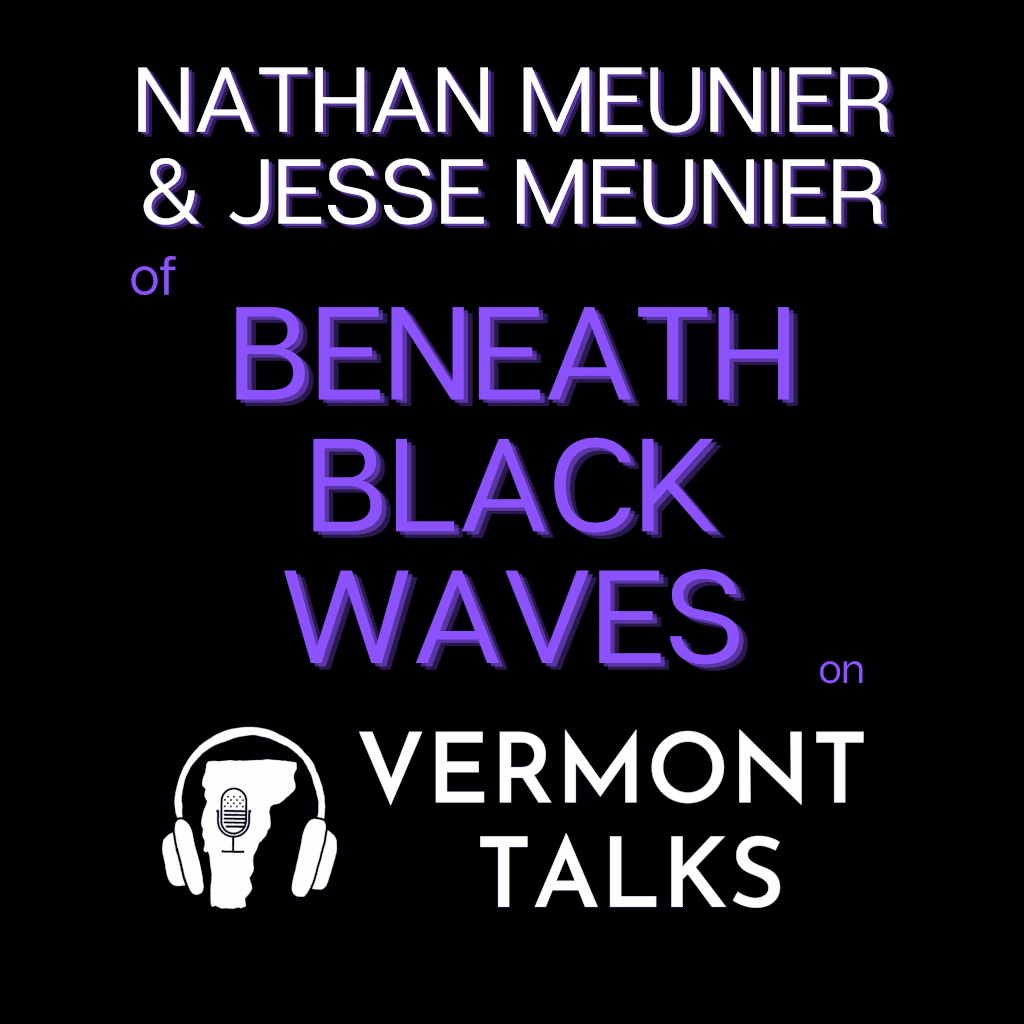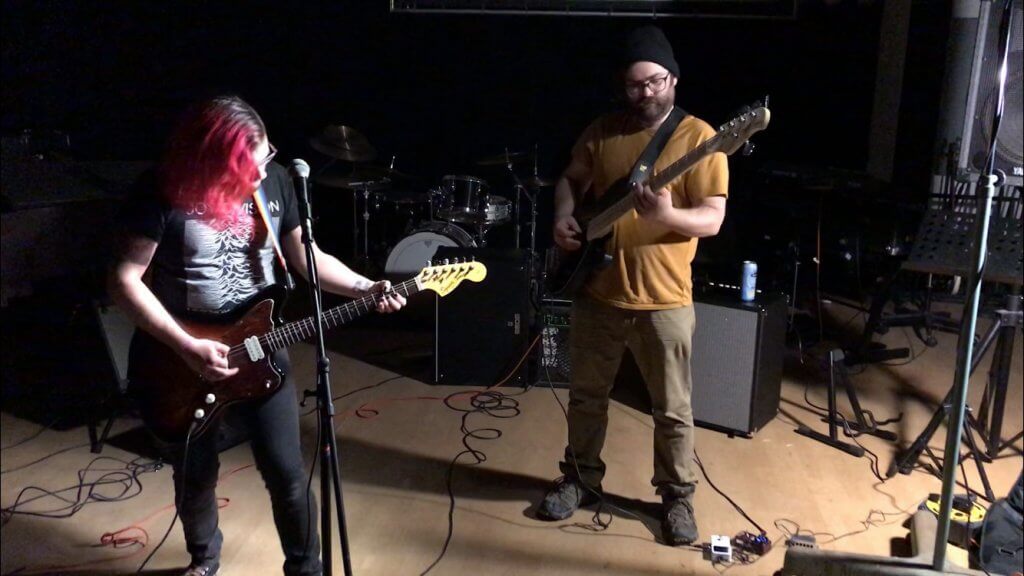
Contact Details
- Facebook: Beneath Black Waves | Facebook
- Email: thenathanmeunier@gmail.com
- Instagram: https://www.instagram.com/beneathblackwaves
- Bandcamp https://beneathblackwaves.bandcamp.com/
- Spotify: https://open.spotify.com/artist/6gUNWFK6C1IcvZTDbUGIdZ?si=q_1TAz_fQNeNcXUbxY8YAg
Interview Details
Recording Date: Saturday July 23rd, 2022
Recording Location: South Burlington
Episode Length: 43:31
Episode Number: 31
Show Notes Link: vermonttalks.com/beneath-black-waves
Short Link: vermonttalks.com/31
Transcript
Please note: transcripts are AI driven and are probably a little wonky!
Becca Hammond 0:01
What’s new 802 I’m Becca Hammond and you’re listening to Vermont talks. Vermont talks may include graphic or explicit content listener discretion is advised. On this week’s episode of Vermont talks we have beneath black waves with Jesse and Nathan Jr. Beneath black waves is comprised of two siblings and a drum machine. They are Beach Golf, post, punk, surf gloom and dark pop. And they are based out of Burlington, Vermont. Nathan, Jesse, welcome on the show. We are here today it is the 20 what is today the 23rd of July it’s Saturday, South Burlington chilling out in my apartment having a grand old time. So tell me about your band.
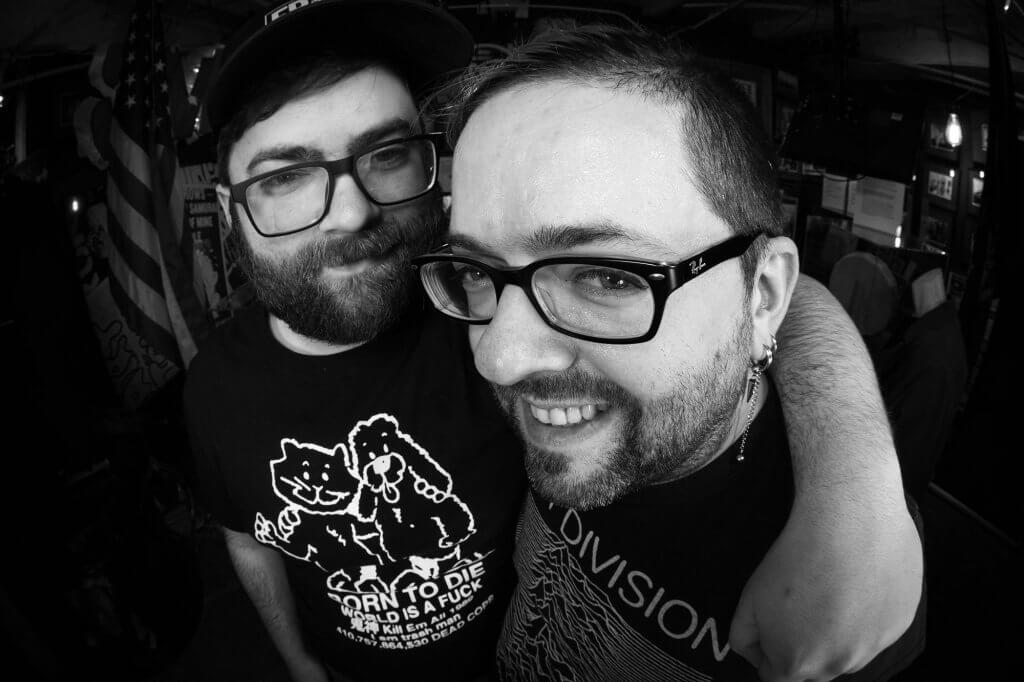
Nathan Meunier 0:49
Sure, yeah. So were we playing a two piece band called beneath black waves? And we started over, we actually started the band and Pandemic times. Just you want to tell the story. You had a really good answer for this one. Last time we were talking about this.
Jesse Meunier 1:02
Yeah. So at the time, I was working, like a super stressful job. And Nate, send me an invite to have some beers on. Was it Oakledge?
Nathan Meunier 1:14
Yeah, it was one of those. We’ve been doing a lot of pandemic social distance beach beers for the past couple years have been one of the ways when it’s nice summertime to get together with people. And in a more safe, open air situation.
Jesse Meunier 1:25
Yeah. So we were, we were hanging out trying to relax, you know, despite the state of the world and the craziness, and we’re gonna figure out how to just like mentally process that all and having some adult beverages and I think we’d been listening specifically to the album sunbather from death, heaven, just like, like intense like, like, grind black metal. Yeah, like black metal. shoegaze. Very loud. Not your typical beach music. Yeah. And that led to like, several mood. Several drinks later, we were like, what if we start a beach band, not really knowing specifically what Beach Golf is? And like, you know, I’ve heard the term kind of thrown about, and we’re just like, you know, what if we just like, shoot for that aesthetic, not really knowing what it is
Nathan Meunier 2:15
just deciding what that is as we go because we like, you know, surfy kind of music a little a lot like post punk stuff, a lot of like classic goth, music and metal and things. So we’re just like, let’s make a beachy sounding band that’s like real dark and moody and depressed sounding. But also like, maybe we’re really poppy, too. So are we play a music that sort of incomplete encompasses those different elements to it? But yeah, we started off basically as a pandemic band and practice for a couple years, or a year and a half or so and then started playing shows last year, too.
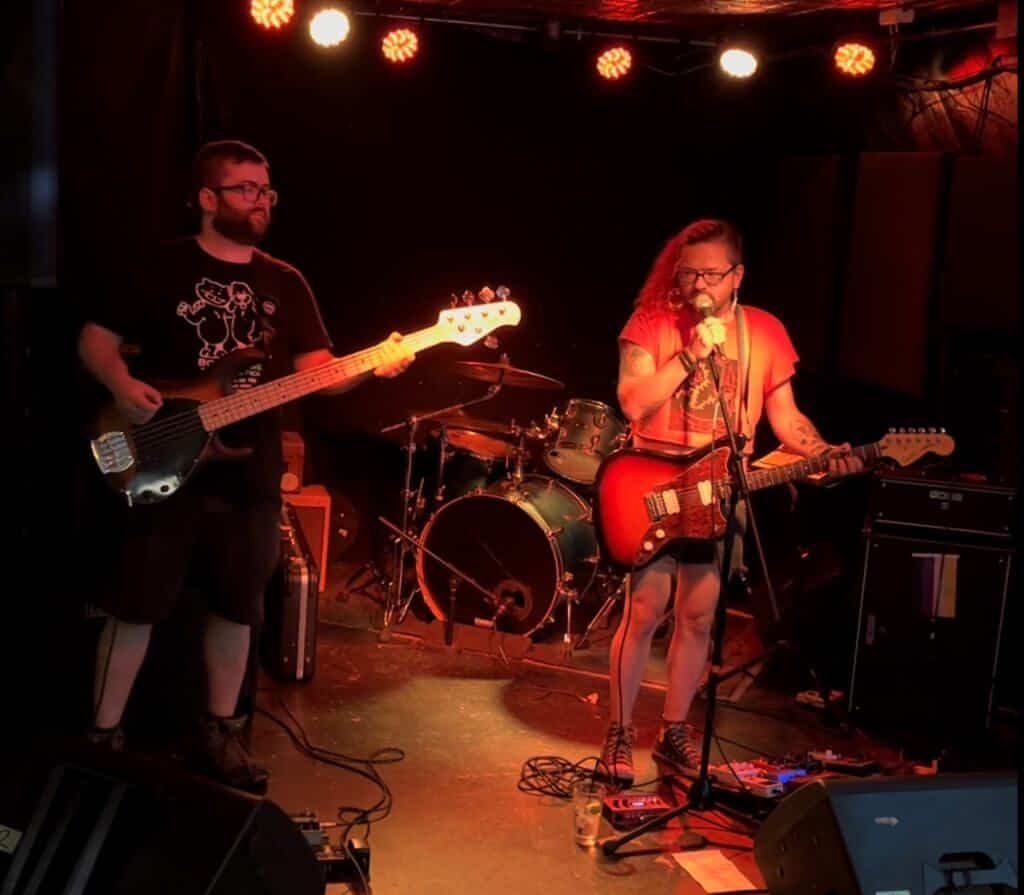
Jesse Meunier 2:44
So yeah, it’s just the just the two of us and a drum machine. Yeah, that’s right, the two siblings and the robotic third member, and also now
Nathan Meunier 2:52
an array of keyboards and other pedals to moving into the family. But yeah, so we just asked and we’ve been playing shows and getting a feel for what that was like. It’s been a lot of fun.
Becca Hammond 3:02
I really love the term Beach Golf. I was gonna ask about Beach Golf surf gloom. That was the other one I think is amazing. Surf. Your sound is it very, completely very Do you have some extremely heavy stuff because I was listening to your set with robot dog. It’s like oh my god, this is so pretty. But then you listed Beach Golf. Like this is I feel the prettiness I feel your aesthetic. I see the Golf I see you how golf you are. But I was like wow, this is some really it felt more like the Beach Boys almost like that pretty sort of at least some of the songs I listened to I didn’t get deep enough clearly because I’m missing the heavy the heavy gloom of the sound you’re going
Nathan Meunier 3:50
yeah there’s a there’s a song on that that we just released the I think it was a five song EP that recorded live with her but Doug and yeah, there’s a couple of songs that are like we have a range of sounds we explored we have one song on there called void that’s very pixelization that it’s like kind of loud, quiet loud. But like at the end it gets almost like Doom sludge metal. Yeah. Heavy loudness, okay, you don’t and we do when we also like kind of, we characterize our music, almost like the core of MS because like we are a pop band with a dark pop band. We play loud pop music, with really dark lyrics and it tends to be on the heavier side or in our sound is a mix of like surf post punk, like some kind of like alt indie rock kind of vibe, sometimes. It’s it’s a variety of sounds but definitely rooted heavily in like a gothic vibe in terms of the lyrical content and like the kind of the image we’re putting together as like, what we’re presenting, you know, when we play shows, but your sound is really kind of dynamic, and then a head kind of draws from a lot of different influences.
Becca Hammond 4:53
I was just going to ask about the influences because you said you were listening to that one particular album at the beach which is very Yeah, yeah. So what other bands, we,
Nathan Meunier 5:03
I mean, obviously very much like a Joy Division Smith’s kind of influence to some extent I used to listen to like the Bauhaus and like Sisters of Mercy. Actually, that’s where my vocal style kind of draws from because I have a deeper voice I’ve sung in different bands. I’ve never really embraced just singing like the low deep kind of corny voice. And like, singers like Peter Murphy from Bauhaus and like Sisters of Mercy, and other bands with that sort of like, really like that vocal style and that Sonic aesthetic, but traffic goes to our children as really like kind of a similar vibe, in terms of like that darker, heavier vocal style, like lower and, but we have listened like a lot of different kinds of music a lot of shoegaze like black acela, I grew up also listened to a lot of like black metal and like Norwegian death metal and like, just kind of heavy stuff, too. But just you want to get to,
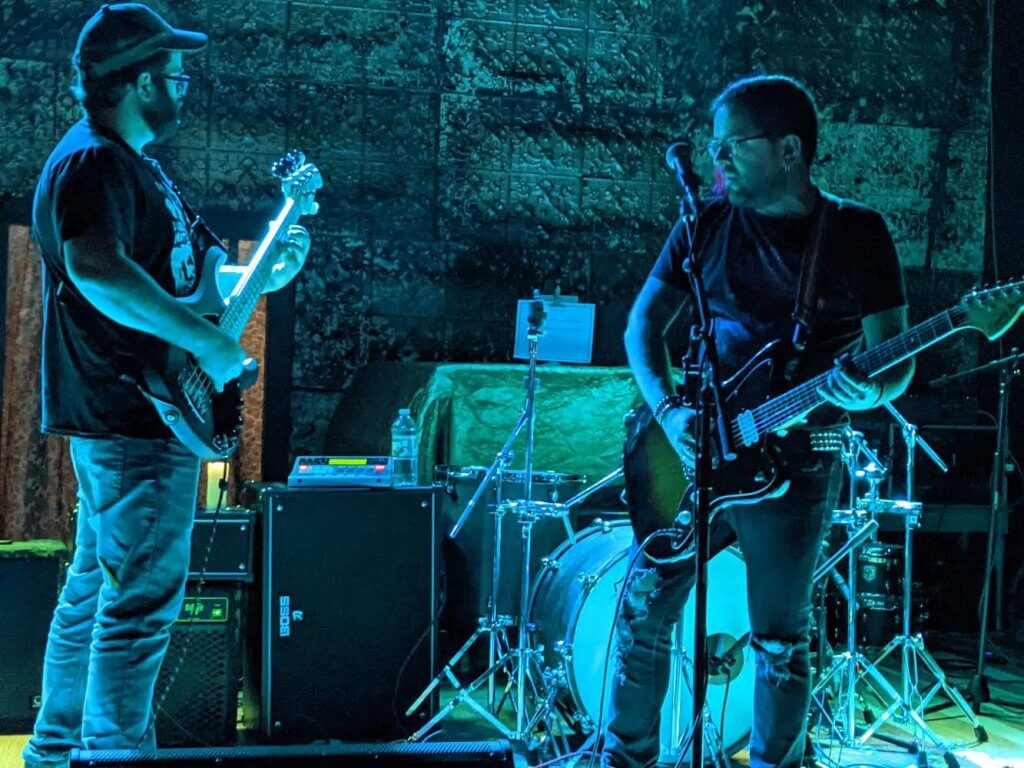
Jesse Meunier 5:53
I think there’s definitely some overlap. I think Nate leans a little bit harder into the more like, straight up like 80s 90s, more like traditional goth stuff than I do. Definitely a big fan of the Smiths and definitely, I’m drawing a little bit more of that influence into like my bass playing. Also, I believe it’s Peter Hook of Joy Division, New Order the bass player, I think, very, a lot of early stuff was kind of like drawing from that like playing higher up on the fret board, like kind of more like almost playing like lead lines on bass or playing more kind of like busy chimey bass parts. But yeah, a lot of really into like 90s 2000s in Iraq. I think one of the things that we found too, in trying to like even though our core sound and especially like Nick vocal stylings are more rooted in goth music. We, we kind of think that a lot of a lot of the best goth bands well, they’re really good. That can be kind of a little bit like one note. So it’s like, they fall into the same kind of Sonic territory over and over again. And the best ones are the bit like post punk or goth or goth adjacent bands are ones that incorporate like, different funky musical elements in a way that you wouldn’t expect, like listening to. I think barbarism begins at home by the Smiths. It’s like, oh, that’s just a straight up like funky like disco baseline, we’ve
Nathan Meunier 7:14
been putting in a lot of funk in our more the stuff we’re working now is a little more synth heavy. So we’re trying to draw some different influences in what we’re doing. So you’ve been putting a lot of like, straight up funky baselines to that kind of, since keyboard heavy stuff I’ve been working on. It’s been really interesting, because I’m still working to see like, how that’s gonna fit into our sound when we put it all together, because it still sounds like us, but it’s like a very different energy than like our first batch of like, dozen or so songs. Yeah, we spent a lot of I actually like we’re so we’re siblings, and we’re 10 years apart. I’m
Jesse Meunier 7:43
the elder sibling. And I think I had a big influence to some extent for seedless and a bunch of weird stuff. When you’re like a kid I remember like hanging out in your bedroom growing up like listening to like Sonic Youth and like, the Pixies and like also a lot of like, funky grindcore but also like Fugazi, if you guys Oh, yeah, I draw a lot from personally. We just like hanging out and playing video games and being exposed to all these music. And I remember like, it’s kind of embarrassing. One of the first albums I forgot was like limp biscuits, chocolate starfish and the hotdog flavored water I think even got like the censored version of the album, which is like doubly embarrassing, but you’re like, ooh, that’s maybe not the best here if you like this kind of like general Sonic framework check out rage because now it’s like
Nathan Meunier 8:29
the first CD about was the first rage against machine album was like when back in like the 90s like the first compact disc I own like orange gets mushy.
Jesse Meunier 8:36
Yeah, like, I remember listening like having fond memories of like being like a 1112 13 year old listening to evil empire and like, talking about like, like cops burning crosses and shit. Like not fully conceptualizing what all that meant at the time. But I’m like, oh, like, yeah, in retrospect, that kind of informed a little bit about adult me.
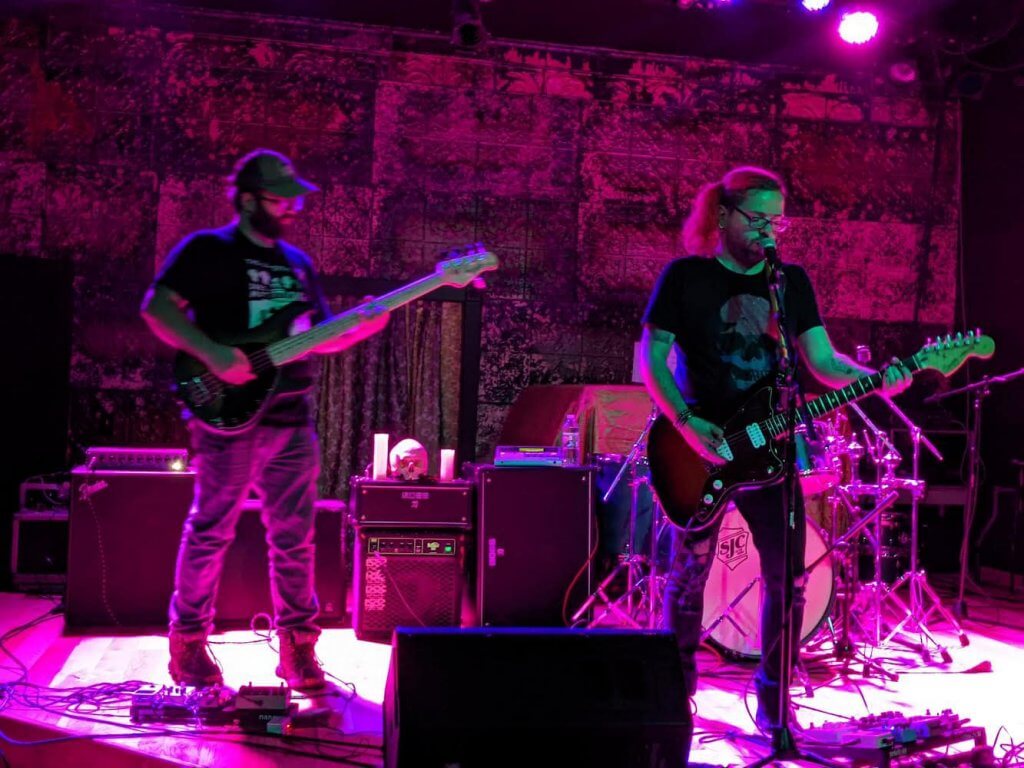
Nathan Meunier 8:54
We have a we have a really broad range of like influences, though. Like, I like a lot of even more modern kind of Goth centric stuff. But as Jesse was saying, like, if you listen to a lot of these didn’t notice that a lot of bands start to sound very samey, and they try to draw influence from other bands that also sound samey. And that just becomes this repetitive cycle of like, a lot of bands that kind of are doing the same aesthetic over and over again. And you see that in any kind of genre too. But like, I tend to notice things that are repetitive in like the things I’m doing and try to pinpoint those. Let’s change that to something different. So I’ve been we’ve been drawing a lot of influence from even like post punk goth stuff. That’s like the old school stuff plus the newer, newer bands that are out which I really listen to a lot of to enjoy. But I find a lot of is very gets cyclical in sort of, I don’t know, it’s like dog chasing its own tail kind of energy. So we’ve been trying to intentionally break out of that a little bit with what we’ve been doing.
Becca Hammond 9:44
Yeah, that’s fantastic. Well, I mean, that’s, that’s kind of like the Beatles, right? They were trying to break their own sound. We sound like ourselves breaker on sound, because I think, speaking the 90s 2000s so many of these subsets of rock during those arrows eras era, I should say. Everyone was so divided. And I think that’s something that’s kind of dying away in the music industry in and of itself just coming from the bottom up. Who cares what you define yourself as if you’re a musician and you’re talented. And I think that there, i i as a kid, you know, the emo early, you know, I, there was attitude, you know, there was such attitude because I listened to heavy metal. And like, if you weren’t heavy enough, I had attitude about it. It was like, it wasn’t the synth, you know, it wasn’t my music, because I liked specifically this type of metal and like, I might respect it, but it wasn’t the same, you know, and everyone had these funny lines that now I feel like I’ve kind of blurred and are mostly going away in some ways. Like, who cares if you play some because you’re trying to think of the right band name. Between the Buried means one of these metal bands that beautiful, beautiful lines in it, and they sing, and they do such beautiful things. And it’s not like I’ll play some of their songs. And like, this is not black metal. It’s not whatever you want to call it has elements of so many other genres that make it sonically interesting. Yeah. Like they keep you interested by changing things up like blur the lines, make something that just is pleasing ear and stop trying to follow the like, specific of like, oh, this certain genre has this certain thing going on. And like you couldn’t be if you’re a grunge player, and that was your thing was grind, like, you kind of like played yourself out of a career. And so
Nathan Meunier 11:39
we went into that a lot with like, trying to write songs that sound different from one another over Yeah, it’s like that intentional, like trying to not just do the same type of thing over and over again.
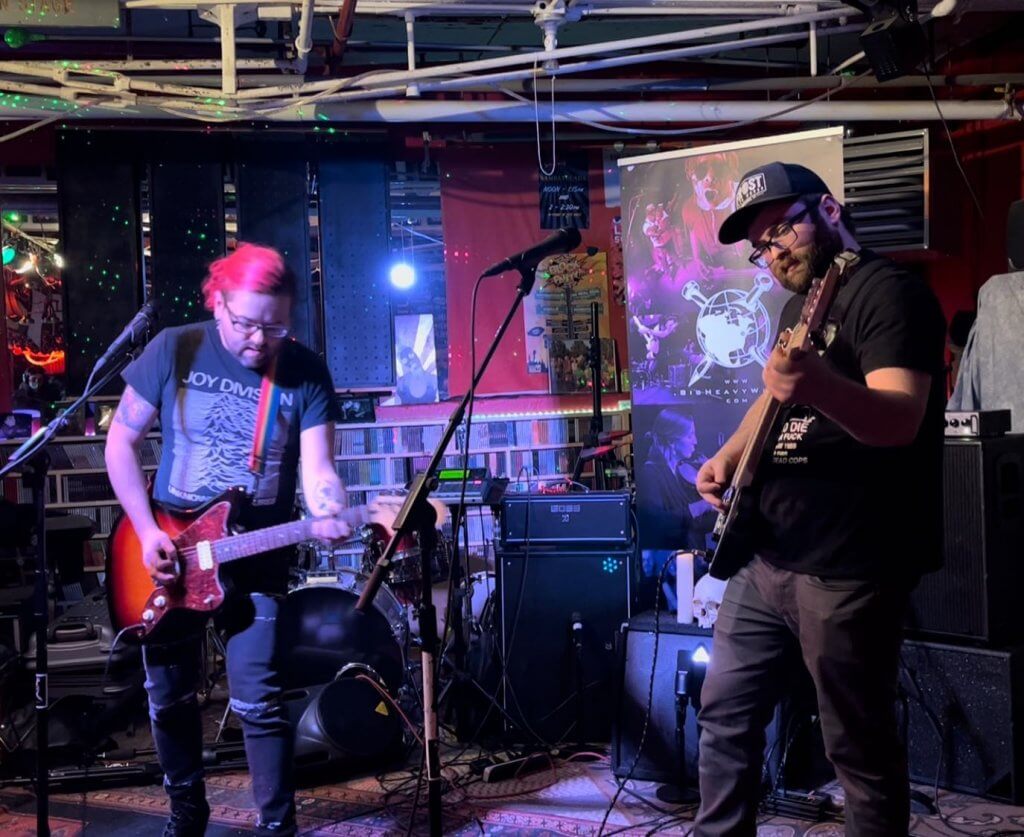
Becca Hammond 11:49
Right, right. Yeah, no, it’s really interesting, because it like you wrote that you’re evolving your sound all the time, you’re talking about so many different influences. And to even be aware of it, most bands aren’t so much aware of, Oh, I see this song sounds like this other song that we wrote, because it’s their own music and who, you know, like, I’ve gotta sound like myself, right? But if you’re actually striving to continue to evolve and change, you’re just going to be making interesting music no matter what, right? Like, that’s a really cool mentality to have. Do you want to talk any more about your process?
Nathan Meunier 12:21
Well, I wouldn’t want to on that point of saying, like I do get tend to get very bored if like, we’re just writing the same kind of song, I think Jesse’s in that same wheelhouse a little bit because like, we’re always, like, you’re just like, I’ve been playing 16 notes too long for these different songs like now we need to play Funk Bass line. So we’re like, we’ll go through waves of creative, being really into like a specific vibe and approach and then being like, you know, we’ve been doing a little too much of this, let’s break it up with something else. But
Jesse Meunier 12:43
right, one of the things to go on a brief aside, before the pandemic, we had started a game design company, a board game design company. And I think, going back years since, like, we were kids, essentially, when I was getting there has been, we’ve been doing some kind of creative process together. We’ve been making four track recordings or like, and it’s interesting to seeing now that so we, Nate actually works in board game design his career. And we’ve kind of put temporarily shelved our game design company to kind of in favor of being able to work on the music a little bit more. But it’s interesting seeing some of the kind of design process that we have incorporated from like the iterative Super Rapid Fire prototyping, kind of find its way into our music making as well. And like, the idea of like, hey, let’s put some creative constraints on this to like, let’s set some rules for how we make the song. It’s almost like design challenges.
Nathan Meunier 13:51
Yeah. Instead of talking about this, like just this the other night, yeah, just doing band practice where we’re just like, Okay, next practice is just like, pick a few parameters and try to write a song within those constraints to see how it comes out. Rather just kind of being like, we don’t know where to go, because we sometimes hear a wall creatively.
Jesse Meunier 14:05
One of the cool pieces of gear that we’ve been incorporating into our songwriting process, especially as we’ve kind of made the decision to double down on some of like, the more electronic dance here end of the spectrum and song dance, yeah,
Nathan Meunier 14:16
Poppy songs type energy. We’re trying to bring some of that into our sound a little bit more. Yeah, so
Jesse Meunier 14:20
we have an maybe you can talk about this a little bit. We
Nathan Meunier 14:23
have the dailies, the dailies Yeah, the since we have to, like shout out to Matt from Nate protocol, who when I was like, what’s your what’s up do you folks using he was going on about their gear? And he’s like, it was like, what if what if I wanted to get like a one everything in one box situation he’s like, get this for what you’re talking describing. So I did. And it’s been really a good tool for like, rapid tracking ideas and throwing in late since because we want to have a sound that incorporates bass and guitar, which is what we use, but also like having over layers of synthesizer stuff on top of that NSF keep, like a Korg keyboard. We’ve been playing with you but we’re trying to like put all those into together into one soup.
Jesse Meunier 15:02
Yeah, the deluge in particular is awesome because it’s like in 30 seconds, Nate can just like hammer out a rough drumbeat and put like maybe a synth arpeggio. And I’m like, Oh, I can work off that I create a baseline. We’re just trying to, like, do some of those like rapid fire, like, can we write the bones of a song, or like a working idea, or like a chorus or a verse in like, less than five minutes and then turn it into something is even as like a like a writing exercise?
Nathan Meunier 15:26
Yeah, because it’s hard. It’s hard to write songs when you don’t have a live drummer. Like if you’re playing the kind of music we do, where it’s very rhythmic, like counter rhythm kind of metal melodies were very our stuff, we’ve tried to inject more like, air into the songs to let things breathe a bit more. But we started off writing a lot of July 16 notes, a lot of very busy parts was always something going on. I’m singing, I’m actually not really I mean, I guess it’s technically I’m a guitar player now and a singer but like, I’ve been a drummer most of my life. So I used to I write songs, I have a job. And we’re also running into this wall. Last time we were working on something I write songs in terms of structure, because I’m thinking of in from a drummer standpoint, where it’s cool, like, here’s a chorus and a verse an intro, and like Jesse was saying, like, that’s not how your brain works the same way. So we’ve been trying to kind of play with that. But to not get too off the rails, the having the ability to like, put down some drum beats quickly without having to like fiddle through menus, like, that’s why the daily district seems legit, there’s a little grid, you just punch out like Kick, kick, kick, kick, snare, snare, drag it and you’ve got to connect it to the continue kind of like little beat goes to dance. But then we can kind of just like jam on that. And before we had those tools, we were just having a lot of practices where we just guitar and bass, we would write the songs without any percussion, or anything. And then I would go back and like, take that we’d record that idea. And I go back and like, sit down and meticulously program are, we have a deal. It’s like a boss, Dr. AD, which is a great drum machine, they don’t sell anymore, but we will go through a program the drums through that and all the like the changes and stuff, and then we bring it back and fine tune it. But for me as a drummer, like a lot of energy I get from a song or like a vibe comes from like percussion. So we’ve been reading a lot of our songs without any percussion to begin with. But having that tool to kind of layer a bit of a drum groove figure out like what does that feel like? Oh, that gives me an idea to like, take this kind of rhythmic approach and guitar and our music is sort of weird though. Because like we like I’m a drummer playing guitar and like I’ve never been like I haven’t sung in a band is like a front person really. For like instance, I was like in like high school or college maybe. And even like my one band I played the most and used to be a ninja death squad was a band to play, which is just a drummer and guitar. And that was me playing drums and screaming and my friend Andy playing guitar, but like it’s been a while since I’ve been like a scene full time in a band as like the main singer. So it’s been interesting to explore, like, what does that look like? And now lately, I’ve just been like trying to for a lot of songs, I noticed I’ve been kind of doubling down and singing along to the lead lanes. Because I don’t play a lot of chords. I play a lot of leads when I play guitar, which is weird because it’s like the way you have no rhythm guitar player, just bass and guitar. So I’m singing along the leads, and then also electronic counter against that. But then I’ve realized I’ve been doing that so much. Again, it’s example of like, I realized I’m doing a thing now I can’t do it for the next three songs. I’m not gonna try to sing along to leads let me do something different try to like right around that crutch I’ve been using so
Jesse Meunier 18:08
also to interject if it if it’s not obvious at this point, we kind of mentioned our weird brains were were some ADHD neuro divergence going on here. We
Nathan Meunier 18:22
we both come from being siblings, we both have the same like flavor of like, unique mental challenges. Yeah, which we, it becomes a creative, like, we work with that. And that’s actually pretty helpful for our process. But we also are very intense. When we get into like creative mode to we’re very, like, intense, we think and move and talk and process things very quickly. But we can also burn each other out too. It’s like pointing to intense laser beams at each other
Becca Hammond 18:47
and they go how quickly can you guys write a song that like an actual How long does it take to write the EP The five tracks?
Nathan Meunier 18:55
Well, we brought about we started off with just kind of being open to seeing like what is what is beach goth post punk, like loud, sad pop music sound like it didn’t well in our context. So we took a while to kind of just write a bunch of songs and like throw stuff at the wall and like maybe half of those first batch we were like maybe 20 songs and like got rid of most of them.
Jesse Meunier 19:16
Yeah, I think the first practice to you came with some like mostly finished songs that didn’t work at all we were crammed into my like, tiny house seven by 18 foot tiny house with just like amps around us we like couldn’t move rattling the tracking. Like you had to like climb over all of our gear to get out and like use the bathroom.
Nathan Meunier 19:36
That was fun, though, because that was like the first one like, oh, yeah, this is definitely could be a band, even if we don’t really know what we’re doing yet. Like, cuz I wrote three songs, because I was doing a lot of solo stuff with drum machine and guitar. At that point. I was kind of wanting to transition away from doing that because it’s more fun to be in a band with somebody than just being a solo performer sometimes. So being able to experiment a little bit. I came into practice really well. I wish I had some songs to play so I wrote some songs. Now under them stuck, like we kind of got a flavor for the sound. But we quickly realized, like we write better when we were like collaborate in real time versus like coming in with finished stuff. So all of our music has been very highly collaborative in terms of like, how, how we read the parts, and like just the style of bass playing is very specific. And like sometimes it’s frustrating, and I’m not giving you ship in a loving way, cuz I’m the older sibling I’m used to giving we give each other crap all the time, but like, he doesn’t play bass, like a normal bass player. Because like, I’m like, Oh, I’ve got this guitar part. Just play these like five notes and keep it real chill. And he’s like, nope, like, yeah, like that’s too boring for me. I need to like, because you started you’ve been playing League guitar most your most of your musical
Jesse Meunier 20:40
yet. I actually like hadn’t I’d barely played any bass before starting in this project. And it’s I feel like the running I guess it’s I don’t know if the joke, the running comment is like, Nate’s not a guitarist, and I’m not a bass player. But I don’t know if we can say that now, I think yeah, I think kind of settled in a little bit more. Yeah.
Nathan Meunier 20:57
But yeah, like you don’t play basically normal bass player would per se, but I think that actually is, even though it can be hard. From a songwriting standpoint, sometimes I’m just like, want you to play in the pocket. And you’ve been doing more of that lately, when you like, we’ve been picking those ones. And it actually makes the music stronger, because we don’t play in the pocket most of the time. And when we both choose to like, get real chill or be double downs, and it really makes an impact in the sound. But also I like that because it’s like pushing, we’re writing music I wouldn’t normally write because we’re just are both pushing each other in interesting directions and counter melodies and counterbalances and rhythmic stuff. And like it takes a long time sometimes to you know, when it sticks, it sticks really well. And if it sometimes we will, like throw stuff against the wall over and over again until it like starts to take a shape that we want it to. But so to get your your question is like sometimes we write songs very quickly, but the EP, we chose that group of songs out of like a bigger group we had written so we wrote, like, we spent the whole first year of being in a band in pandemic, just being like, well, we’re not gonna play shows anytime soon, let’s just write a bunch of music. So that’s what we did. We wrote like 1516 songs, I think got till about 20. And then we got rid of a bunch of them, I think we’ve got about almost 20 songs now again, that are we will throw some out every once awhile and put new ones in. But we’ve got a good batch of music now that we’re kind of focused on. And we’re trying to push and write newer stuff in a different vibe. But
Becca Hammond 22:12
yeah, that’s amazing. I mean, even if you don’t call them finished songs, if you can just put out huge amounts of content, pick what you like, that’s kind of gold, right? Because it’s what you’d like the most out of everything you’ve created. Sure,
Nathan Meunier 22:24
we’ve been cherry picking stuff a lot, because like well put time in something and realize like, this isn’t quite ready. So we’ll put it on the shelf. And to do we will put songs away for a while and then bring them back. And then like find the the element that did shift them, pick our song with him. And transformation was an example where it was a cool concept. And it’s not that much different now than we used to play. But we made some adjustments and it became a tighter, more fun to play song was one of my favorite songs to play. Lately, when we’ve been doing live shows,
Jesse Meunier 22:50
we’ve got another one in the works too, that’s kind of in this in a similar vein, it’s called masks. It was one of the first songs that he was playing live, since on the recording MIDI log. And I was like, I like the song. But I’m like, I always feel like I can, you know, I’m not quite at the level of bass playing, I want to be to write the kind of part I want to write for it. And now I feel like I’m getting kind of more into that having spent a little bit more time working on things. And yeah, and I think a lot of that a lot of the focus now is like kind of maybe like reproaching some of those older tracks that have potentially have good ideas in them and seeing like, can we write this? Can we salvage it? Or should we just kind of like, throw it in the scrap pile and just bang out some more stuff?
Becca Hammond 23:30
Are you constantly recording so that you can get back and remember these little tidbits? Yeah,
Nathan Meunier 23:35
I having a having a phone like um, we usually record if we get like ideas on our phones, we’ll play it play an idea of during practice, flush it out, get a version of it, and I’ll record it and just set it aside then they’ll email you the files but then like once we it becomes like a full we can play it from start to finish. And also we haven’t talked about this yet though. Like lyrically vocal melodies important to our sounds, so when we’re playing a song, I don’t like typically have words to go to the songs. So there’s a whole lot of like, Meow, meow, meow, meow, meow, meow, meow into the mic. I’ll like Miss below like blah, blah, blah, see, like gibberish. It’s like Simlish kind of, like, an I took me a long time comfortable doing that. Because it’s like, very weird to be like, just speaking nonsense. But like focusing on the scene and melody to kind of hammer ideas like how do I want to sing this, that’s actually been a really big part of our creative process is just like putting a mic on playing through the music that we kind of figured out and then like, rip doing reps of that is just me like, pushing my voice and singing and trying to like, do better like to contend with melodies that are interesting to me. And then I go back and kind of fine tune them. But like getting that whole rough draft like Scratch concept for a song is really important. And then we’ll go and take that and I’ll go back and like program drums and we’ll kind of talk about the parts and rearrange them and it’s usually, I don’t know, it feels like it’s taken longer for us to write the songs that we’ve been working on but they’re a little more complicated. There’s a lot more different. We’re Sonic ideas are trying to explore so it’s been like, you know the song that’s like Chris Isaac inspired energy, but it’s definitely different sounding kind of thing. That was the one that was on the video. I think we posted. It’s what’s the song called? I can’t remember now off top my other side. Other side. Yeah, it’s very slow, moody, quiet. And there’s like little like shimmery kind of guitar where he just kind of at the real, it’s just a lot of like, yes,
Becca Hammond 25:22
that’s the one I listened to. I was like, this doesn’t sound like God. Yeah, it’s
Nathan Meunier 25:27
a very different vibe. But like even getting to the point where we could play that through and like realize, oh, this is cool. Like, right. It’s not quite what we normally do. But it works in our sound. Yeah, but it took a while to like get up to get the reps going. And like feeling that out. It’s easy to play like the the more punk gear so we just slam it out in the car. And it’s fun to get the energy of it. But something more delicate like that, where there’s a lot of like nuance to how I strum a chord and how the voice vocals go.
Jesse Meunier 25:51
I think the I think that was like the first time I’d experienced experimented a little bit more with like, non straight up like post punk. That kind of more like a jazzy or slinkier style of bass playing. I think that’s something to like, you mentioned Chris Isaac as inspiration in that one, a lot of the times we when we’re shooting to like create, like a certain vibe in a song we might pull from something like the song void was, I think you’d also mentioned was inspired by kind of the general dynamic of the Pixies. And I remember, before we wrote that one, I think it was David Bowie giving an interview about why the Pixies were such an awesome band, and specifically talking about that, like, shift in like loud, quiet, loud, dynamic, and bringing that idea into practice and being like, Ooh, what if we tried to, like, emulate and do our own version of that, and a lot of the songs that we write will like, whole from either a particular like musical influence, and maybe it’s like, we shoot for that. We have a near miss. And then the thing that we’ve created is still like, oh, okay, there’s something there. Yeah. And then it just becomes its own thing. So like, even though the other side doesn’t necessarily sound like you know, Chris Isaac’s Wicked Game. It like loosely that holds
Nathan Meunier 27:03
the energy Yeah, that’s like I was thinking I was trying to like will be like, delicate and like haunting sounding. And the lyrical stuff is was actually really interesting, though, because it gets it gets or sounds or pretty weird lyrically. So
Jesse Meunier 27:14
yeah, I’ll let I’ll let Nate elaborate on that. They want to Yeah,
Becca Hammond 27:19
yeah, feel free. Please go on.
Nathan Meunier 27:21
Yeah, so like, one of the things I think it’s most interesting about being able to be like a singer in a band. Like it’s really satisfying for me to play guitar, and program all the drum stuff and be on stage doing that, but also like, thinking about like, what do we want to present as like, what are we about because like, some bands just write like songs about like, whatever. And it’s like, we kind of going into this project I wanted to have like a very specific like headspace about like the lyrical content. So our first batch of songs we we set the perimeter of like, let’s write songs about death,
Jesse Meunier 27:51
then we’re like, how do we add a thinking in the in the like, the funky like, let’s make this a design challenge recently coming from like, board game design, and sort of like, what if we make this this EP about death, but make it from like, unconventional perspectives like death, maybe from the perspective of someone or something that has died. And, and then maybe like adding in a layer of like, lyrical abstraction on top of that,
Nathan Meunier 28:15
I tend to write in a lot of abstract like, I’m not usually reading song mode. I don’t think any of the songs are really about just like, What You See Is What You Get, but what the lyrics are, it’s like, it’s all subtle references and like, vague. Like, it’s almost like I paint pictures in my brain of like, what is the story? And what’s the scene what’s happening? Like, we have one song that I don’t think we play anymore, but it’s like, it’s one of those first batch of songs about death, where it’s like, singing, like I said, what sounds like kind of a love song. But it’s actually from the perspective of like a skull, like just lying in the field that was like a dead body that’s been rotting for years. And like, the set like the lyrics are meant to kind of sound like oh, like, you’re longing for this loss, love or whatever. But it’s actually about really, there’s a twist later in the song where it’s like, the actual person that you’re longing for is the person that killed you and you are longing to in like, reconnect with them in perhaps a more like, nefarious way. But you’re just a skull on the ground. So it’s like so the idea of like, trying to try to subvert like typical patterns of narrative stuff in songs. We’ve got a song called
Jesse Meunier 29:14
going going back. I just want to mention that my one of my favorite lines from that one is my lips are gone. Only bones are left to kiss. Oh,
Nathan Meunier 29:21
yeah. That’s a good line. Oh, yeah. Because, like I’m waiting waiting for you. Yeah, carrying the milk. Yeah. So yes, lurk stuff is fun, because like, we’ve got a song called Dead sons. And I don’t know that we’re gonna play that one that much more because it’s kind of it’s repetitive. It’s a fun one to play because it was definitely like drawn from that initial like, very gothy trying to get very typical dancy moody kind of punky goth song, but the lyrics are about like, kind of like this procession of, of people that are like marching, marching in the night up to a spire, and like, reaching this point of ascension, where they sort of like shed their skin and like metamorphose into the sky is like serpents writhing into like this void lights and like hydrate sounds but like it’s just like weird. So this is just like a weird, weird concept from trying to like, think of things I’m thinking of like culty stuff and I’m very inspired like the occult and weird, weird specific things like we have a song called oh gosh, what’s the postpunk? Well, I can’t napkin drawing a blank of all of our songs. It’s
Transcribed by https://otter.ai
